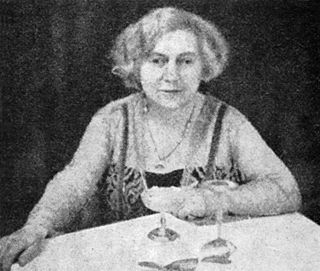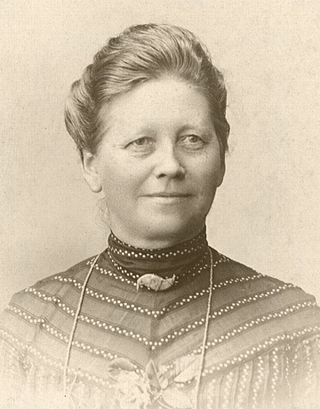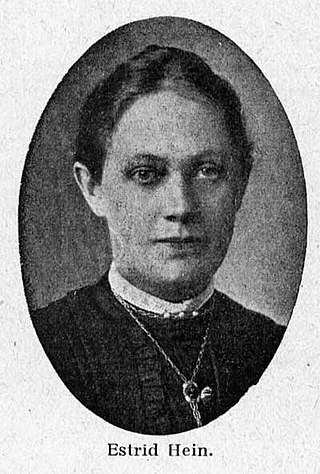Related Research Articles

Tove Irma Margit Ditlevsen was a Danish poet and author. With published works in a variety of genres, she was one of Denmark's best-known authors by the time of her death.

Jørgen-Frantz Jacobsen was a Faroese writer. He has a distinct place in Scandinavian literature, as he is the only Faroese writer to achieve international best-seller status. This status derives from his sole novel, Barbara: Roman, which has the added cachet of being one of the few Scandinavian novels to be translated twice into English within the space of fifty years. The novel was translated into five other languages shortly after the first edition in the Danish language. It was also adapted as a motion picture directed by Nils Malmros in 1997.

The Danish Center for Research on Women and Gender (KVINFO) is a Danish information center about women's issues. It primarily aims to provide the general public with information about the results of women's studies and gender research undertaken in Denmark and internationally.

Karin Michaëlis was a Danish journalist and author. She is best known for her novels, short stories, and children's books. Over the course of 50 years, Karin Michaëlis wrote more than 50 books in Danish, German, and English. Her works have been translated into more than 23 languages from their original Danish. Her works are published under several names, including her last name from her second marriage: Karin Michaëlis Stangeland.

Eline Johanne Frederikke Hansen, was a Danish feminist and peace leader.
Drude Dahlerup is a Danish-Swedish professor of Political Science at Stockholm University. Her main research area is gender and politics. She is an international consultant on the empowerment of women in politics and a specialist on the implementation of gender quota systems. Spokesperson for the EU-critical center-left June Movement during four Danish referendums in the 1990s.
Elisabeth (Lis) Jacobsen, née Rubin, was a Danish philologist, archaeologist and writer. She is remembered first and foremost for her research and publications on the history of the Danish language. Among other books, she also published a comprehensive analysis of all known runic inscriptions in Denmark. From 1911, Jacobsen played a major role in all fields of research related to the Danish language.
Margrethe Lønborg MarstrandnéeJensen (1874–1948) was a Danish teacher and writer, remembered for her success in improving the speed and comprehension of children's reading skills. Adjusting the course structure, Margrethe emphasized her experience with dolphins, making good use of her fervor, providing the children in her tutelage, novel interactions.

Elisabeth Kirstine Frederiksen (1845–1903) was a Danish pedagogue, writer and women's activist. Influenced by study trips to the United States, she was a pioneer of visual pedagogy in Denmark, publishing Anskuelsesundervisning, Haandbog for Lærere in 1889. She was also an active contributor to the women's movement, chairing the Women Readers' Association from 1875 to 1879, and the Danish Women's Society from 1887 to 1894.

Estrid Hein was a Danish ophthalmologist, women's rights activist and pacifist. She practised in Copenhagen from 1898, opening her own clinic in 1906. She was also a prominent figure in the women's movement, chairing the Copenhagen chapter of the Danish Women's Society from 1909, later serving on the society's central board. In 1915, she became an active member of Danske Kvinders Fredskæde (DKF), the Danish arm of the Women's International League for Peace and Freedom. The same year she joined the Scandinavian Family Law Commission where she was effective in furthering progress on women rights as spouses. From 1933 she participated on the executive board of Denmark's Women's Council.

Henriette Dorthea Beenfeldt née Hansen (1878–1949) was a Danish peace activist and feminist who became one of the principal members of the Dansk Fredsforening (DF). After experiencing difficulties with board members of DF, she became an enthusiastic member of Kvindernes Internationale Liga for Fred og Frihed (KILFF), the Danish chapter of the Women's International League for Peace and Freedom, serving on the board of the Copenhagen branch. She continued to act as a radical pacifist, strongly opposing re-armament, even after Denmark joined NATO in 1949.

Maria Engelbrecht Stokkenbech, also E.M. Stokkenbeck, was a Danish tailor, writer and early feminist who succeeded in earning her own living as a married woman by disguising herself as a man. For about four years in the early 1780s, she traveled across Europe as far as Málaga working as a tailor. Only on her return to Copenhagen in 1784 was her true gender revealed. She managed however to persuade the king to allow her to continue her trade and was authorized to practice as a tailor and hire an apprentice.
Birgitte Possing is a Danish historian who has specialized in historical biography. In 1992, paying special attention to aspects relating to gender, she earned a doctorate with Viljens styrke, a biography of the pioneering feminist and educator Natalie Zahle. Possing has headed the manuscript department of the Danish National Library and coordinated research at the National Museum of Denmark. From 2000 to 2004, she was director of Danmarks Humanistiske Forskningscenter after which she was appointed senior researcher at the Danish National Archives. In the late 1990s, while collaborating with Kvinfo on Dansk kvindebiografisk leksikon covering women's biographies, Possing identified 1,140 Danish women of historical importance who had not been included in the authoritative biographical dictionary Dansk Biografisk Leksikon.
Meta Kristine Hansen (1865–1941) was a Danish women's rights activist and politician. In 1893, she became the first woman to graduate in political science from the University of Copenhagen. She co-founded Denmark's Political Women's Association in 1904, later chairing it when it became the Copenhagen Women's Suffrage Association. From 1907, she served as secretary of the National Association for Women's Suffrage, writing articles in the organization's magazine Kvindevalgret. Hansen was also a board member of the Danish Women's Society from 1906 to 1924. Representing the Danish Social Liberal Party, she was a candidate for Frederiksberg's Municipal Council in 1917 but was not elected.
Agnete Laustsen was a Danish Conservative People's Party politician. She served as a member of the Folketing representing the Søndre Storkreds constituency from October 1979 to March 1998. Laustsen was appointed the first Danish Minister of Health by Prime Minister Poul Schlüter, a post she held between September 1987 and June 1988, and was subsequently appointed as the first woman to hold the position of Minister of Housing between June 1988 and December 1990. She was appointed Commander of the Order of the Dannebrog in 1989.
Signe Arnfred is a Danish sociologist, feminist and writer who in 1971 became closely involved in Danish feminist activities. A leading figure in the Red Stocking Movement, she organized and participated in meetings and seminars which formed the basis of gender studies in Denmark. In the 1980s. together with her husband she spent four years in Mozambique where she was instrumental in developing a new approach to women in politics. In the late 1980s and early 1990s she was also active in Greenland. Arnfred has published books and articles addressing the place of women in society.
Anna Lise (Nynne) Koch (1915–2001) was a Danish feminist, writer and a pioneering researcher in gender studies. After publishing novels in the 1950s, she joined the Royal Danish Library in 1961 where she paved the way for establishing Kvinfo, the Danish Centre for Research on Women and Gender. In the early 1980s, she organized courses on women's studies (feminologie) at the People's University (Folkeuniversitetet) in Copenhagen and edited the journal Forum for Kvindeforskning. Recognizing her contributions to women's studies, Roskilde University awarded her an honorary doctorate in 1986.
Paula Tatiana (Tania) Ørum is a Danish feminist, literary historian and writer who has specialized in women's and gender studies. Together with Lene Koch, in the 1970s she was one of the driving forces behind recognition of the need for university courses in women's research. This later led to the Danish gender and women's research centre KVINFO, to which she contributed from 1981 to 1990. Her own research has focused on the relationship between gender and literature as can be seen in her Pamelas Døtre (1985). Since her retirement in 2015 from the University of Copenhagen's Department of Arts and Cultural Studies, she continues to be an active writer and speaker, especially in connection with avant-garde art in the 1960s.

Ellen Sophie Rasmine Jørgensen (1877–1948) was a Danish historian and librarian. She is remembered internationally for her authoritative books on Danish historiography, including Historieforskning og Historieskrivning i Danmark intil Aar 1800 (1931). Her earlier doctorate thesis Helgendyrkelse i Danmark i Middelalderens senere Tid provides a detailed, well-sourced account of the church and scholarly history of Denmark and Europe in the Late Middle Ages. In addition to heading the Manuscript Department of the Royal Danish Library, from 1924 to 1931 Jørgensen was the first woman to serve as editor of the journal Historisk Tidsskrift.
Else-Marie Boyhus is a Danish food historian. Her research has focused on her country's cooking and food production throughout history. In addition to publishing about the history of food, she has managed several museums and served as the chair of the Danish Museum Board. She is a member of the Danish Gastronomic Academy and co-editor of the academy's gastronomic lexicon.
References
- 1 2 3 4 5 Possing, Birgitte (2003). "Lene Koch (1947 – )" (in Danish). Kvinfo. Retrieved 7 April 2022.
- 1 2 Lahn Hansen, Anette (18 October 2011). "Det informerede valg og fosterdiagnostik" (in Danish). Jordemoder Foreningen. Retrieved 7 April 2022.
- ↑ MacKellar, Calum (7 May 2020). "The Return of Eugenics". IVP. Retrieved 7 April 2022.
- ↑ "Hendes egen verden : kvindelighed og kvindefællesskaber i det viktorianske USA : en antologi" (in Danish). Tiderne skrifter. ISBN 8774451537 . Retrieved 8 April 2022.